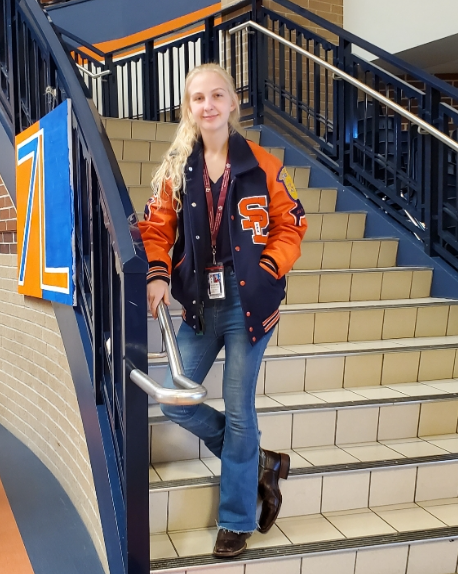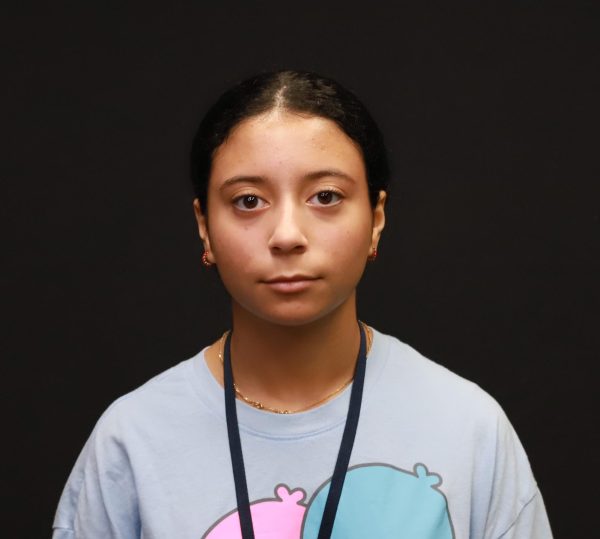Raising livestock, reviving old skill sets, building character- Future Farmers of America accomplish this and more, marking them as trailblazers for the future of American agriculture. These individuals learn the principles of farming and rearing animals that go well beyond the scope of inaccurate farmer stereotypes. Lettering in FFA for her efforts in horse judging and the care of her lamb, Lady B, Junior Maggie Williams provides a unique perspective on FFA from her experience in the field
FFA consists of various classes;these courses teach the attributes of a decisive leader and confidence when conducting meetings, along with other technical skills such as welding. FFA is a long-term commitment, taking up a good chunk of a student’s schedule and even requiring attention outside of school. This has proven exceptionally true because people have recently selected their livestock and must use what they know to take care of them.
“You [get to learn] about the basics [of FFA], the history of its foundation, and just what’s going on,” Williams said. “Everyone learns about different types of animals to see what [they] would like to do. [We’re] just trying to go out and get different types of experiences… and spread the word of agriculture to expand everybody’s knowledge of it.”
On October 7th, members of FFA were able to acquire their livestock during animal selection. This is when students from various schools gather at the barns (where they are to keep their animals) to draw numbered chips that will be called in order for each person to select their animal out of the ones provided. The procedure keeps the process fair as no particular school or individual is guaranteed first pick and everyone personally chooses their animal; their options for livestock include dairy, poultry, horses and other projects.
“[Every day we] wake up, hop on the bus and go to the barn at 5:30 in the morning,” Williams said. “When we go to the barns, we dump the feed and make sure [the animals] are okay and then head back [to school].”
This year, Williams has once again chosen lamb as her project, her focus lying in the overall well-being of her ewe, Reverie. For Reverie to show well in competition, she has to have good structure, muscle quality, walk correctly and execute a performance to the judge’s liking. Other behaviors that are rewarded are Reverie’s ability to quietly stay at Maggie’s side and Maggie’s overall showmanship as an exhibitor.
“I go up to the barns whenever I get the chance in the evening,” Williams said.
I go feed and then walk [Reverie] around, and make sure her stall’s clean and she has everything she needs.” Last year, Williams met the point requirements to letter in FFA and earned her jacket. Qualifying for a letter jacket is a sign of accomplishment in a certain sports team, fine art or co-curricular; lettering demonstrates a student’s commitment and hard work while keeping up with school.
“[I earned my letterman by] mostly participating in horse judging competitions,” Williams said. I went and did as much as I could. Also work[ing] through LD and raising helped me a lot to gain experience.”
Around February, those with livestock projects are to attend judging competitions to display their progress in raising their animal. Judges will evaluate the livestock and competitors will be awarded promptly and have a chance to boost their school’s rankings.
“Later in the year we’re gonna start walking and bracing [the lambs to get them] ready for show,” Williams said.
One of Williams’ specialty events is horse judging, where conformation plays a big part in determining the condition of a horse.
“With horse judging, we don’t entirely get very much experience,” Williams said. “It’s mostly just going in watching how they work with performance courses and conformation classes. Conformation is seeing how their structure is, how they are shaped and if they have a well shaped body compared to performance, we’re [mostly] trying to see which out of the group of horses is the best.”
FFA is mainly a high school level organization, however, it plays a much larger role than simply being a leisure club. The association helps people be more in touch with how agriculture affects our food, employment, and quality of life.
“[FFA] it’s more than just raising [animals]- It develops a leader and it helps show you different ways of life. And a lot of people didn’t realize what they wanted to do until they joined FFA,” Williams said “[There’s]… a lot of different things to try [and] everything is just to help us build for the future and our careers.”
Williams continues to tend to Reverie while continuing other projects such as a chicken coop. If you are interested in future events or even joining FFA, you can visit their website (Seven Lakes FFA) or follow them on instagram @7lakesffa.
“[It’s important to spread the word] because a lot of people don’t realize our agriculture is a part of our everyday lives. It’s in every second of our lives, giving us the foundation for everything.”



